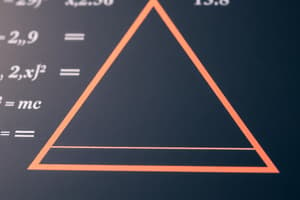Podcast
Questions and Answers
What is the reciprocal identity for cosine?
What is the reciprocal identity for cosine?
- 1/sin
- 1/csc
- 1/cos (correct)
- 1/tan
Which trigonometric identity equation involves sin and csc?
Which trigonometric identity equation involves sin and csc?
- sin^2 + cos^2 = 1
- sin = 1/csc (correct)
- cot = 1/tan
- cos = 1/sec
What type of graph is symmetric about the y-axis?
What type of graph is symmetric about the y-axis?
- Cosine
- Cosecant
- Tangent
- Sine (correct)
Which trigonometric function's graph is periodic?
Which trigonometric function's graph is periodic?
What practical application of trigonometry involves measurement of distances and angles?
What practical application of trigonometry involves measurement of distances and angles?
Which of the following is a double angle identity in trigonometry?
Which of the following is a double angle identity in trigonometry?
What is the trigonometric ratio that represents the ratio of the side opposite an angle to the longest side of a right triangle?
What is the trigonometric ratio that represents the ratio of the side opposite an angle to the longest side of a right triangle?
Which trigonometric function is the reciprocal of cosine?
Which trigonometric function is the reciprocal of cosine?
What does the tangent (tan) of an angle in a right triangle represent?
What does the tangent (tan) of an angle in a right triangle represent?
Which trigonometric function symbolizes the ratio of the side adjacent to an angle to the longest side of a right triangle?
Which trigonometric function symbolizes the ratio of the side adjacent to an angle to the longest side of a right triangle?
If sin(θ) = 3/5, what is cos(θ)?
If sin(θ) = 3/5, what is cos(θ)?
What is the trigonometric ratio that represents the ratio of the side adjacent to an angle to the longest side of a right triangle?
What is the trigonometric ratio that represents the ratio of the side adjacent to an angle to the longest side of a right triangle?
Study Notes
Exploring Trigonometry: The Math of Angles
Trigonometry is a branch of mathematics that deals with the relationships between the sides and angles of triangles. While it might seem daunting at first, understanding trigonometry opens up a world of possibilities, from programming to navigation and even music. Let's dive into this fascinating area of math and uncover the beauty of trigonometry.
The Trigonometric Ratios
Trigonometry primarily focuses on three key ratios: sine, cosine, and tangent.
- Sine (sin): The ratio of the side opposite an angle to the longest side of a right triangle.
- Cosine (cos): The ratio of the side adjacent to an angle to the longest side of a right triangle.
- Tangent (tan): The ratio of the side opposite an angle to the side adjacent to that angle in a right triangle.
These ratios are generally symbolized as:
[ \begin{align*} \sin \theta &= \frac{opposite}{hypotenuse} \ \cos \theta &= \frac{adjacent}{hypotenuse} \ \tan \theta &= \frac{opposite}{adjacent} \end{align*} ]
Common Trigonometric Functions
Beyond the ratios, trigonometry introduces additional functions that help us work with angles and their corresponding ratios:
- Cotangent (cot): The ratio of the side adjacent to an angle to the side opposite that angle in a right triangle.
- Secant (sec): The ratio of the side opposite an angle to the side adjacent to that angle in a right triangle (the reciprocal of the cosine).
- Cosecant (csc): The ratio of the side opposite an angle to the side adjacent to that angle in a right triangle (the reciprocal of the sine).
Trigonometric Identities
Trigonometric identities are equations that relate different trigonometric functions of the same angle. They are helpful for solving equations and simplifying expressions. Some common identities include:
- Reciprocal Identities: (\sin \theta = \frac{1}{\csc \theta}), (\cos \theta = \frac{1}{\sec \theta}), and (\tan \theta = \frac{1}{\cot \theta}).
- Pythagorean Identity: (\sin^2 \theta + \cos^2 \theta = 1).
- Double Angle Identities: (\sin 2 \theta = 2 \sin \theta \cos \theta), (\cos 2 \theta = 1 - 2 \sin^2 \theta).
Trigonometric Graphs
The sine, cosine, and tangent functions each have their own unique graphs. The graphs are periodic, meaning that they repeat over time or angle. The sine and cosine graphs are symmetric about the y-axis, while the tangent graph is symmetric about the origin.
Applications of Trigonometry
Trigonometry has many practical applications, including:
- Measurement of distances and angles in navigation and surveying.
- Engineering problems related to structures and machines.
- Design of music instruments, such as wind and string instruments.
- Animation and computer graphics.
- Modeling waves and oscillations in physics and engineering.
As you delve deeper into trigonometry, you'll encounter more advanced concepts and applications that will enrich your understanding of this fascinating and powerful area of mathematics.
Sources: H. M. Edwards, H. E. Schey. Geometry: Transformations, Constructions and Measurements. Wiley, 1994. H. M. Edwards, F. B. Kruskal. Calculus with Analytic Geometry. Holt, Rinehart and Winston, 1977. D. Bressoud, P. B. Rasmussen. Trigonometry: A Student's Guide to the Fundamentals. Wiley, 2005.
Studying That Suits You
Use AI to generate personalized quizzes and flashcards to suit your learning preferences.
Description
Dive into the world of trigonometry and explore the fundamental concepts including trigonometric ratios (sine, cosine, tangent), common functions (cotangent, secant, cosecant), identities, graphs, and practical applications in various fields like navigation, engineering, music, and physics. Enhance your understanding of this powerful mathematical discipline.




